

1,000-Year-Old Manuscript of Beowulf Digitized and Now Online. One outcome of the upcoming “Brexit” vote, we’re told, might free the UK to pursue its own unfettered destiny, or might plunge it into isolationist decline.
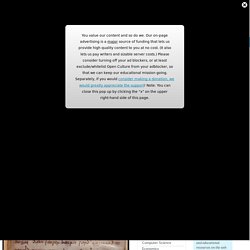
1,000-Year-Old Manuscript of Beowulf Digitized and Now Online – minima medievalia. Beowulf. Monsters and Marvels in the Beowulf Manuscript - Medieval manuscripts blog. Detail of the opening words of Beowulf, beginning 'Hwæt' ('Listen!)
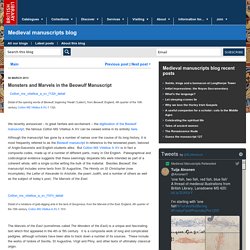
, from Beowulf, England, 4th quarter of the 10th century, Cotton MS Vitellius A XV, f. 132r. We recently announced – to great fanfare and excitement – the digitisation of the Beowulf manuscript; the famous Cotton MS Vitellius A XV can be viewed online in its entirety here. Although the manuscript has gone by a number of names over the course of its long history, it is most frequently referred to as the Beowulf manuscript in reference to the renowned poem, beloved of Anglo-Saxonists and English students alike.
But Cotton MS Vitellius A XV is in fact a composite codex, made up of a number of different parts, many in Old English. Paleographical and codicological evidence suggests that these seemingly disparate bits were intended as part of a coherent whole, with a single scribe writing the bulk of the material. The character of Dragon in Beowulf from LitCharts. List of Beowulf characters. This is a list of Beowulf characters.
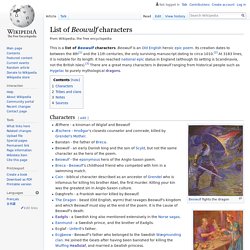
Beowulf is an Old English heroic epic poem. Its creation dates to between the 8th[1] and the 11th centuries, the only surviving manuscript dating to circa 1010.[2] At 3183 lines, it is notable for its length. It has reached national epic status in England (although its setting is Scandinavia, not the British Isles).[3] There are a great many characters in Beowulf ranging from historical people such as Hygelac to purely mythological dragons. Characters[edit] Östergötland. Place in Götaland, Sweden.
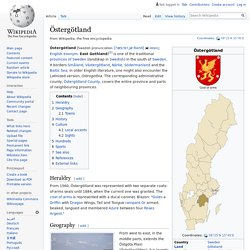
Vendsyssel. Vendsyssel is the northernmost traditional district of Denmark and of Jutland.
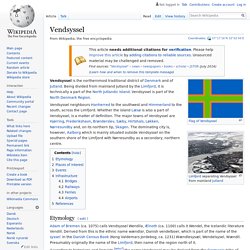
Being divided from mainland Jutland by the Limfjord, it is technically a part of the North Jutlandic Island. Uppland. Place in Svealand, Sweden Uppland (Swedish pronunciation: [ˈɵpːland] ( listen)) is a historical province or landskap on the eastern coast of Sweden, just north of Stockholm, the capital.
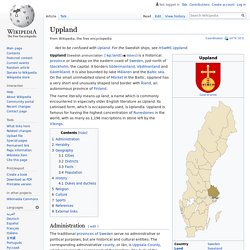
It borders Södermanland, Västmanland and Gästrikland. It is also bounded by lake Mälaren and the Baltic sea. On the small uninhabited island of Märket in the Baltic, Uppland has a very short and unusually shaped land border with Åland, an autonomous province of Finland. The name literally means up land, a name which is commonly encountered in especially older English literature as Upland. Administration[edit] The traditional provinces of Sweden serve no administrative or political purposes, but are historical and cultural entities. Swedes. Swedes (Swedish: svenskar) are a North Germanic ethnic group native to Sweden.[18][19][20][21][22][23][24] They mostly inhabit Sweden and the other Nordic countries, in particular Finland, with a substantial diaspora in other countries, especially the United States.
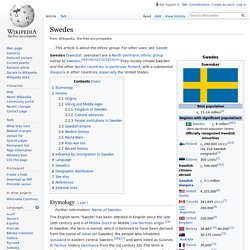
Etymology[edit] History[edit] Origins[edit] Originating in semi-legendary Scandza (believed to be somewhere in modern Götaland, Sweden), a Gothic population had crossed the Baltic Sea before the 2nd century AD. Metonymy. Metonymy (/mɛˈtɒnəmi/)[1] is a figure of speech in which a thing or concept is referred to by the name of something closely associated with that thing or concept.[2] Etymology[edit] The words metonymy and metonym come from the Greek μετωνυμία, metōnymía, "a change of name", from μετά, metá, "after, beyond", and -ωνυμία, -ōnymía, a suffix that names figures of speech, from ὄνυμα, ónyma or ὄνομα, ónoma, "name".[3] Background[edit] In addition to its use in everyday speech, metonymy is a figure of speech in some poetry and in much rhetoric.
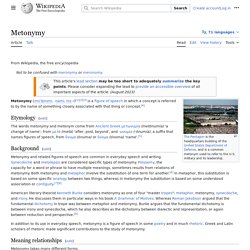
Sweden. Country on the Scandinavian peninsula Coordinates: 63°N 16°E / 63°N 16°E / 63; 16 Sweden (; Swedish: Sverige [ˈsvæ̌rjɛ] ( listen)), officially the Kingdom of Sweden (Swedish: Konungariket Sverige [ˈkôːnɵŋaˌriːkɛt ˈsvæ̌rjɛ] (
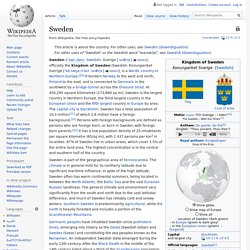
Scylding. A mention of Scyldingas in the Beowulf Descent from Sceaf[edit] From Skjöld to Halfdan[edit] The number, names, and order of the Skjöldung kings vary greatly in different texts until one comes to Halfdan/Healfdene.
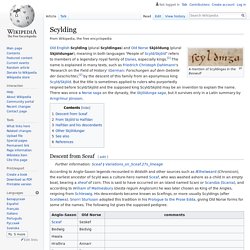
All Old English texts call Scyld's son and successor Beaw or some similar name. (The name was expanded to Beowulf in the poem Beowulf, probably in error by a scribe who thought it was an abbreviation for the name of the poem's hero, who is quite a different person). According to Saxo Grammaticus' Gesta Danorum (Book 1), Skjöld was succeeded by a son named Gram. Grendel. An illustration of Grendel by J. R. Skelton from Stories of Beowulf. Grendel is described as "Very terrible to look upon. " Merovingian dynasty. The Merovingian kingdoms at their height The Merovingian dynasty was the ruling family of the Franks from the middle of the 5th century until 751.[1] They first appear as "Kings of the Franks" in the Roman army of northern Gaul. By 509 they had united all the Franks and northern Gaulish Romans under their rule.
They conquered most of Gaul, defeating the Visigoths (507) and the Burgundians (534), and also extended their rule into Raetia (537). In Germania, the Alemanni, Bavarii and Saxons accepted their lordship. Jutland. The North Jutlandic Island is still regarded a part of Jutland although it was separated from mainland Jutland by a flood in 1825. Jutland (/ˈdʒʌtlənd/; Danish: Jylland [ˈjylanˀ]; German: Jütland [ˈjyːtlant]), also known as the Cimbric or Cimbrian Peninsula (Latin: Cimbricus Chersonesus; Danish: Den Kimbriske Halvø; German: Kimbrische Halbinsel), is a peninsula of Northern Europe that forms the continental portion of Denmark and part of northern Germany.
Jutes. The Jutes (/dʒuːts/), Iuti, or Iutæ were a Germanic people. According to Bede,[1] the Jutes were one of the three most powerful Germanic peoples of their time in the Nordic Iron Age,[2][3] the other two being the Saxons and the Angles.[4][5] The Jutes are believed to have originated from the Jutland Peninsula (called Iutum in Latin) and part of the North Frisian coast. In present times, the Jutlandic Peninsula consists of the mainland of Denmark and Southern Schleswig in Germany.
Freyr. Believed to depict Freyr, viking age. Freyr (Old Norse: Lord), sometimes anglicized as Frey, is a widely attested god associated with sacral kingship, virility and prosperity, with sunshine and fair weather, and pictured as a phallic fertility god in Norse mythology. Freyr is said to "bestow peace and pleasure on mortals". Yngvi. Old Norse Yngvi, Old High German Inguin and Old English Ingƿine are names that relate to a theonym which appears to have been the older name for the god Freyr.
Norway. European country. Romerike. Øvre Romerike. Old Norse. Old Norse was a North Germanic language that was spoken by inhabitants of Scandinavia and their overseas settlements from about the 9th to the 13th century. Widsith. Chattuarii. Heaðobards. Gepids. North Sea. Frisii. Franks. Finnic peoples. Västergötland. Geats. Zealand. Danes. Brondings. Breca the Bronding. Hæþcyn. Swedish–Geatish wars. Hnæf. Skjöldr. Sigmund. Swerting. Hygelac. Hrothgar. Unferð. Thegn. Denmark. Völsung. Sigmund. Wayland the Smith. Wealhþeow. Weohstan. Wiglaf. Onela. Prose Edda. Wiglaf. Wægmunding. Beowulf. Eofor. Eofor. Yrsa.
Hrothgar. Burton Raffel. Skjöldunga saga. Hrólfs saga kraka. Halga. Hrólfr Kraki. Hrothgar. Grendel's mother. Breca the Bronding. Beowulf. Eponym. Breca the Bronding. Beowulf. Cain and Abel. Grendel. Eadgils. Saga. Eanmund. Unferð. Ecgþeow. Wægmunding. Norse clans. Wulfings. Heaðolaf. Hrothgar. Eofor. Wild boar. Hæþcyn. Ongentheow. Swedish–Geatish wars. Hygelac. Kings of the Angles. Offa of Angel. Ermanaric. Finn. Frisians. Finnesburg Fragment. Sinfjötli. Finn.